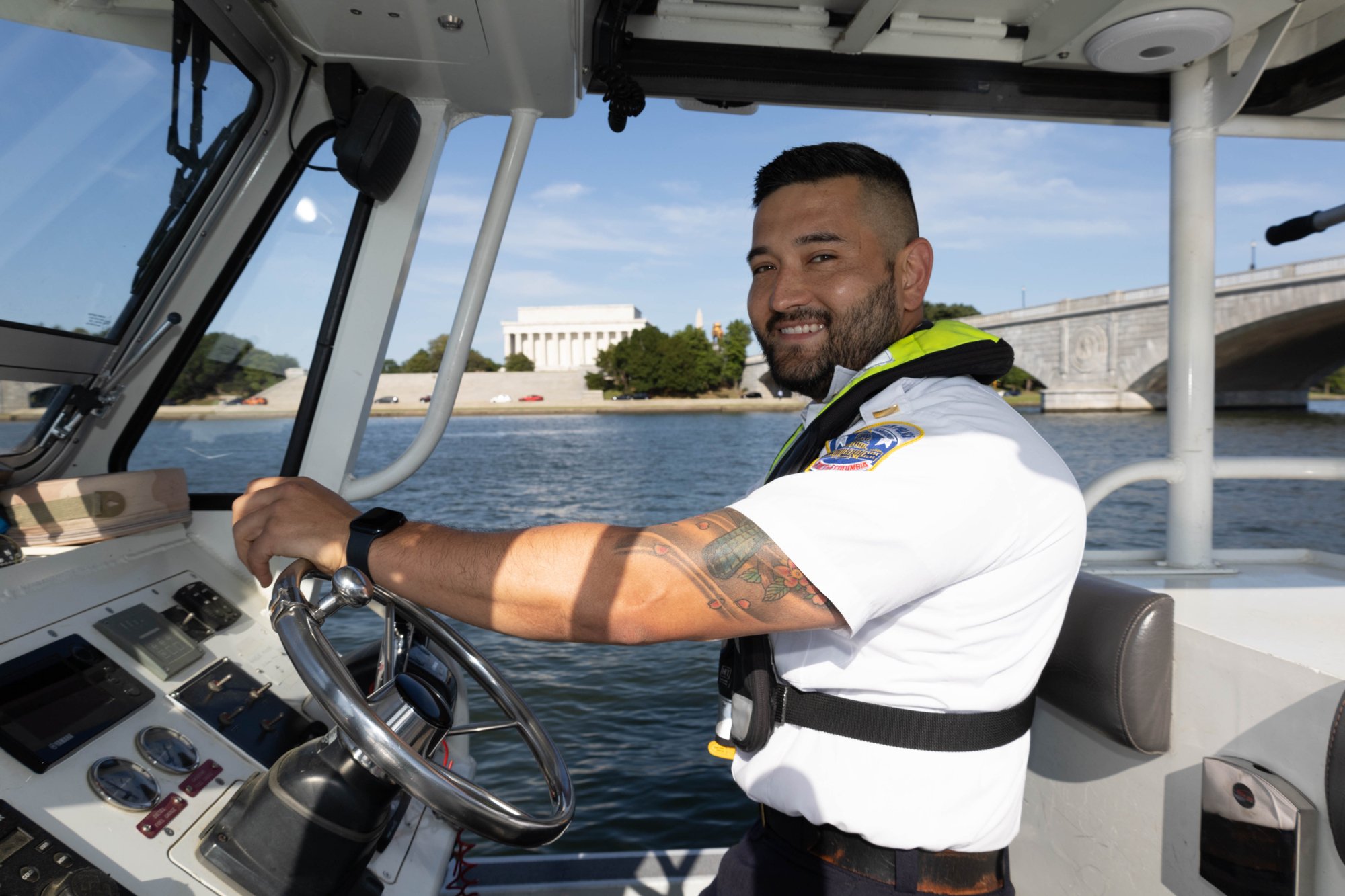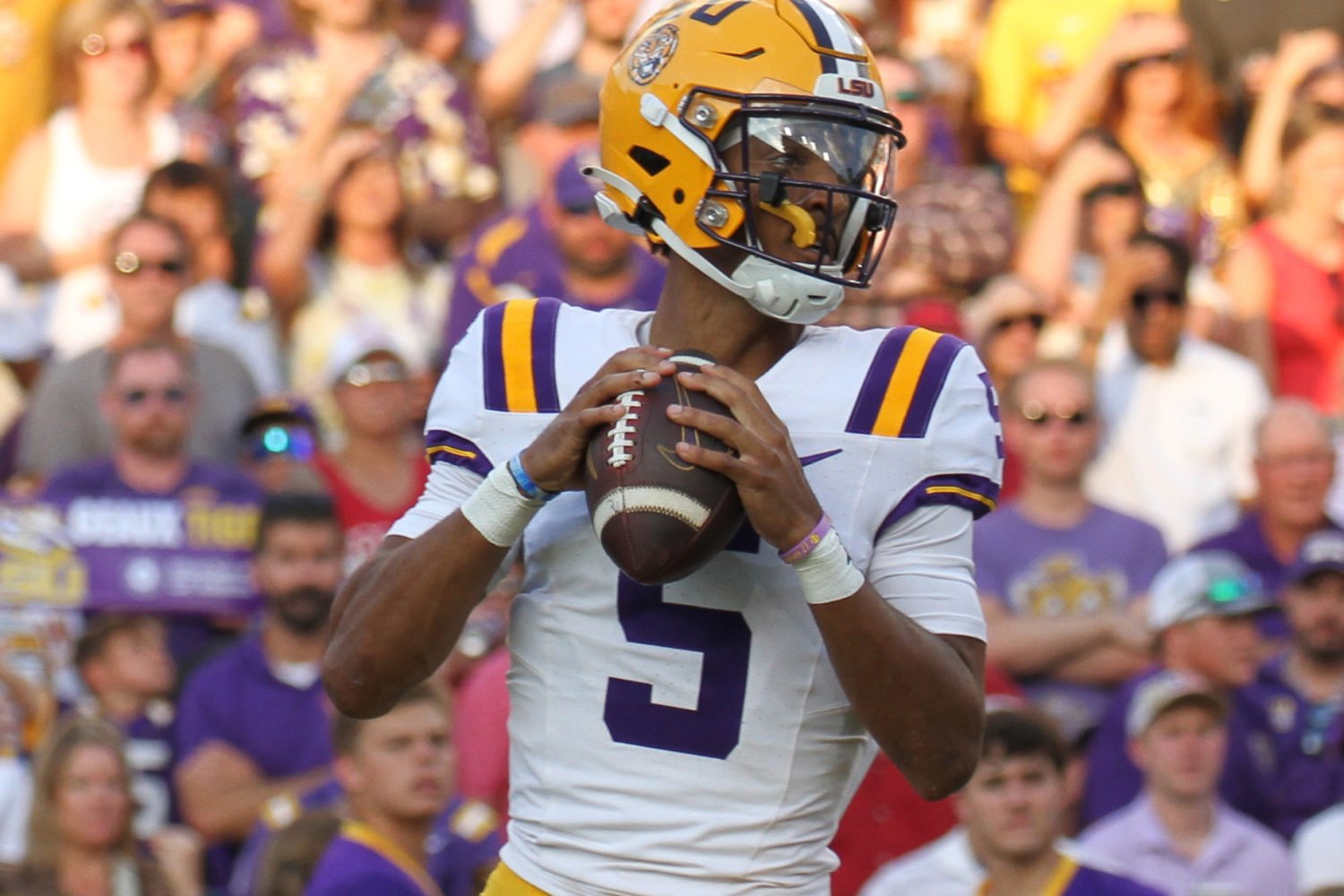If you’re a cop working DC’s waterways, your biggest concern is the boats: speedboats, jet skis, kayaks, yachts. All the sweet deathtraps of summer. Yes, recreational watercraft can be lovely—but they can also catch fire, sink, or crash. People slip and get hurt. Boaters take the helm drunk. They ride the bow like they’re in Titanic, then plunge into the water below.
In these unfortunate circumstances, the Metropolitan Police Department’s harbor-patrol unit will typically respond—and the calls always surge in summer. “I don’t know if you’ve seen the water on July Fourth, but it’s crazy,” says Lieutenant Andrew Horos, who’s been running harbor patrol since 2018. “The boating season is our busiest time, and July Fourth is like our Super Bowl.”
On the Fourth, the recreational vessels launch early. By 5 AM, they’re creeping up the river past Alexandria, veering left at Hains Point, passing under the 14th Street Bridge to anchor between the mouth of the Tidal Basin and the Lincoln Memorial. By noon, that area is choked with boats—boats upon boats upon boats, hundreds at peak, tied off to one another, the boaters grilling and drinking and swimming before watching the fireworks erupt over the Mall.
For the most part, the holiday shenanigans are good-natured. “Everyone’s usually happy,” Horos says. “It’s not a frat party like you would imagine. We don’t get a lot of fights.” But the potential for mishaps is huge. “We get a lot of calls for heat issues, medicals, alcohol-related stuff. People that maybe drank too much and fell in.” Consequently, all officers are on duty that day—12 hours minimum, sometimes closer to 18—patrolling the waters downtown.
When boaters are hurt, the injuries tend to be minor—but from time to time, somebody drowns. “That’s why we say to wear a life jacket,” Horos explains. “Because no matter how strong a swimmer you are, if you slip and you hit your head and you roll in, the water is unforgiving.” It’s been at least five years, he says, since the last Fourth of July fatality. “But I don’t want to jinx us. Knock on wood.”
On a Wednesday afternoon in early April, Horos takes me out into the middle of the Potomac on a bright-blue Metal Shark Defender, 28 feet long with a small enclosed cabin, a strip of police lights up top. The day is unseasonably hot, cloudless with moderate winds. We are not on patrol—it’s a joy ride, provided for the benefit of this story.
During this voyage, I make a faux pas. I mention my only frame of reference for harbor patrol: the part of the TV show The Wire where a Baltimore homicide detective gets exiled to the marine unit for insubordination. “Everyone always brings that up,” Horos replies. “They’re like, ‘It’s a punishment to go to harbor, right?’ ” But his unit, he insists, is not a penal colony for wayward cops: “This is a highly sought-after position. A lot of officers come here and stay their whole career.”
Another difference from The Wire is the nature of the work. Unlike Baltimore, DC doesn’t have a commercial port, so officers primarily deal with recreational boaters. Horos says he gets lots of calls for speeding watercraft—but he also handles boat fires, cars that veer into the water, and suicides from bridges. Then there are the “NSSEs”—National Special Security Events, such as inaugurations and state funerals—in which MPD shuts down the waterways and sweeps the bridges for suspicious packages and dirty bombs.
The work has a peculiar side, too. “Once, we got a call for a floating human hand underneath one of the bridges, but it ended up being a Halloween prop,” Horos says. “And we get a lot of calls for human remains that end up being some sort of animal.” Often, those animals are deer, which sometimes jump in from the seawall and drown. (In the harbor-patrol office hangs a mounted pair of antlers above a plaque that reads “Tidal Basin Deer First Responders.”)
When I ask why harbor patrol is such a plum post, Horos gestures to the water around us: “This. What we’re doing right now.” He loves being out on the river, and the tenor of the work is different from other police units. “You don’t necessarily see as much violence on the river. Most of the time, we don’t issue any citations or make arrests. We mostly encounter people who want us there—they call us because they need help.”
“It takes a lot of mental fortitude to recover a deceased person” from the water.
Of course, the job has an underbelly, and Horos bristles when I bring up a gruesome fact: that springtime is when the bodies come up. “Who told you that?” he snaps, though he acknowledges that it’s true.
“I’m not going to go into too much detail, but if someone ends up in the river when the water’s cold, the body will usually stay down there,” he says. This has to do with decomposition, which is delayed by the chill—but once the water warms, bodies at the bottom of the river fill with gases and start rising. When they reach the surface, harbor patrol tends to receive a call.
Things get trickier when a recovery involves diving. The Potomac is unusually turbid, a mix of pollution, runoff from heavy rains, and sediment that erodes from the banks. So when divers go down, it’s pitch-black—sometimes they can’t see their hand in front of their face. That work is dangerous. A lot of things can go wrong. “It takes a lot of mental fortitude to recover a deceased person,” Horos says.
During a dive, officers take many precautions. There’s always a backup diver standing by, plus a DC Fire and EMS boat to render aid if necessary. While underwater, divers are hooked up to a comms system to keep in touch with the officers above. They also wear full drysuits—per DC workplace health standards, the polluted waters of the Potomac cannot touch an officer’s skin.
To search for the body, a diver moves in an arc pattern at the end of a tether. Then that pattern is repeated again and again, with a couple more feet of rope each time. Without visibility, the whole search is conducted by feel. This can be unnerving—especially when a catfish or log brushes by. Horos prefers not to discuss it. “You know,” he says, “we like to focus on happy stuff instead.”
Near the end of our boat ride, Horos asks if I want to go fast. I do, so he turns to the officer at the helm and asks if he’s “confident to show off some of our turning abilities.” By “turning abilities,” Horos apparently means doing doughnuts: The boat begins making tight loops in the water, spinning across the surface, leaning precariously to one side.
“On the Fourth of July, this whole area will be completely filled with boats,” Horos shouts over the motor, gesturing toward the waters by the Lincoln Memorial. “We’ll anchor our command boat right in the middle of all the chaos. It’s set up with food and water for the officers, so it’s kind of like a base for them to come back to.” Then, throughout the day, six to eight MPD boats patrol the area, staying visible to prevent rowdiness, and proximate in case the merriment takes a bad turn. The Coast Guard and fire department maintain a presence, too.
In fact, most of DC law enforcement works the Fourth—on water and land alike. “It’s hot out, there’s people shooting fireworks, people drinking citywide, and we have a million people coming in [from out of town], so it’s all hands on deck,” Horos says. Working the holiday is grueling, but the river’s a good place to be. When night falls, the fireworks loom over the water, filling the entire sky. Horos shows me pictures on his phone of enormous orbs exploding over the silhouettes of fancy boats.
When the fireworks are over, officers escort the revelers out, setting up patrol boats at the points of exit, all their lights on for visibility. Then vessels begin filing slowly back down the river, toward wherever they plan to dock. “It’s kind of like leaving a stadium event,” Horos says, “but generally everyone’s really careful.”
As for the intoxicated, they tend to stay over—boaters are allowed to park in the anchorage zone until morning, and usually 40 to 50 vessels remain. “We’re leaving officers out there all night,” Horos says, “just to make sure no one goes in the water, and if they do, we’re right there. There’s no issues 99 percent of the time.”
But if, God forbid, you should become that 1 percent—say, you’re drinking, hit your head, and tumble into the depths—officers will frantically descend. Ideally, you’ll be wearing a life jacket and you’ll bob on the surface until someone collects you. But maybe you forgot to put it on. If you’ve slipped underwater, it’s dire—a police boat will cordon off the area while a helicopter beams a spotlight from overhead. Then a diver will jump in, braving the murk to feel around.
These officers will do their best to pull you out—perhaps even alive, if you’re lucky. Better yet would be a year like the past few, where nothing much goes wrong at all. Regardless, the patrol boats will gather. “The river’s the place to be on the Fourth of July,” Horos says. “We’ll be there. We have to be.”
This article appears in the July 2023 issue of Washingtonian.
Correction: A previous version of this article referred to NSSEs incorrectly—they are “National Special Security Events,” not “National Security Special Events.”


















